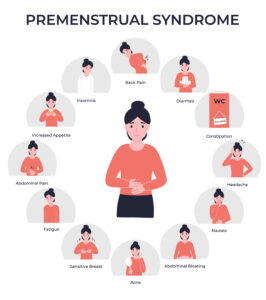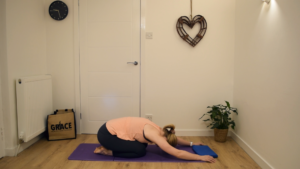
Premenstrual Syndrome- What can we do about it?
How much do you know about PMS? Is it something that affects you? Are you aware there are a few things that might help?
What is it?
A week or two before your period starts you may notice bloating, headaches, mood swings, or other physical or emotional changes. These monthly symptoms are known as Premenstrual Syndrome (PMS). About 85% of women experience some degree of PMS however a few women will have more severe symptoms that disrupt their daily life, known as Premenstrual Dysphoric Disorder (PMDD).
So what are some of the symptoms of PMS?
- Cravings- sweet or salty foods
- Fatigue but also Insomnia
- Loss of appetite or an upset stomach
- Bloating
- Constipation
- Acne- glands produce more sebum, clogging pores and triggering a breakout
- Pain- back pain, headaches, tender breasts, joint pain
- Mood swings- irritability, anger, crying spells, depression and anxiety
- Memory and Concentration difficulties
Gosh, it doesn’t sound great does it?! For a long time I didn’t keep track of how I was feeling over a month, and often I worried about experiencing some of these symptoms. It can be quite scary to feel out of control of your mood, or to feel more clumsy than normal, or have unexplained pain. Having awareness of these symptoms and tracking my month now means when they come I know they will go, and so coping with them is so much easier.
What can I do?
Firstly, do track your symptoms. If they come and go in a monthly cycle, they are more likely to be PMS. However, symptoms can be similar to other conditions such as chronic fatigue syndrome, depression and anxiety, thyroid disease and perimenopause, so it is worth keeping a diary for a few months and then visiting your GP if you find there isn’t a monthly pattern to them.
It is also good to see your GP if the symptoms are causing problems with your personal relationships, job or other daily activities.
But is there something we can do to help?
- Exercise has been found to be beneficial. 30 minutes of moderate activity most days or vigorous activity on fewer days can be effective at reducing symptoms of PMS. Something like Pilates regularly, brisk walking daily, and maybe a few short HIIT sessions a week is perfect!
- Foods rich in B Complex V
 itamins may help symptoms. Foods such as salmon, leafy greens, eggs, dairy, beef, shellfish, beans and lentils, sunflower seeds, and nutritional or Brewer’s Yeast may be beneficial.
itamins may help symptoms. Foods such as salmon, leafy greens, eggs, dairy, beef, shellfish, beans and lentils, sunflower seeds, and nutritional or Brewer’s Yeast may be beneficial. - Complex carbohydrates too, such as wholegrain breads and cereals, are packed with fiber. Fibre can keep your blood sugar even, which can ease mood swings and cravings.
- Avoid or cut back on salt, caffeine, sugar and alcohol when you are experiencing symptoms of PMS as often these will make the symptoms worse, or certainly no better.
- Mindful activity can help too. Something like Pilates or Yoga can improve the experience of pain, reduce feelings of irritability and aid fatigue.
- Some supplements such as folic acid, magnesium, vitamin E, and Calcium may help.
- There are also some medications that can help however do speak to a health care professional about your options
I hope you can see that there are some practical things we can do to improve our PMS symptoms. Being aware of them as they come and go will help us, knowledge is power!



 itamins may help symptoms. Foods such as salmon, leafy greens, eggs, dairy, beef, shellfish, beans and lentils, sunflower seeds, and nutritional or Brewer’s Yeast may be beneficial.
itamins may help symptoms. Foods such as salmon, leafy greens, eggs, dairy, beef, shellfish, beans and lentils, sunflower seeds, and nutritional or Brewer’s Yeast may be beneficial.
No Comments
Sorry, the comment form is closed at this time.